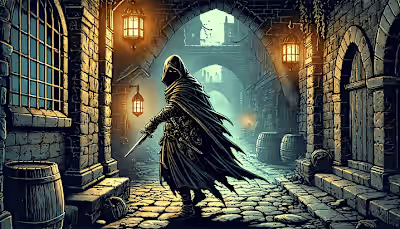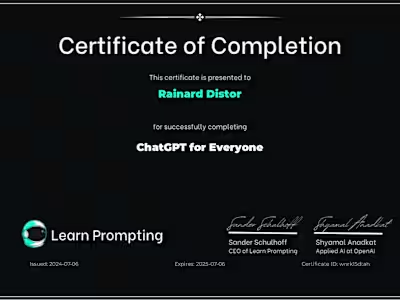"The Matrix" Movie Review
The Matrix is a 1999 science fiction action film that explores the concept of reality and features mind-bending special effects and action sequences.
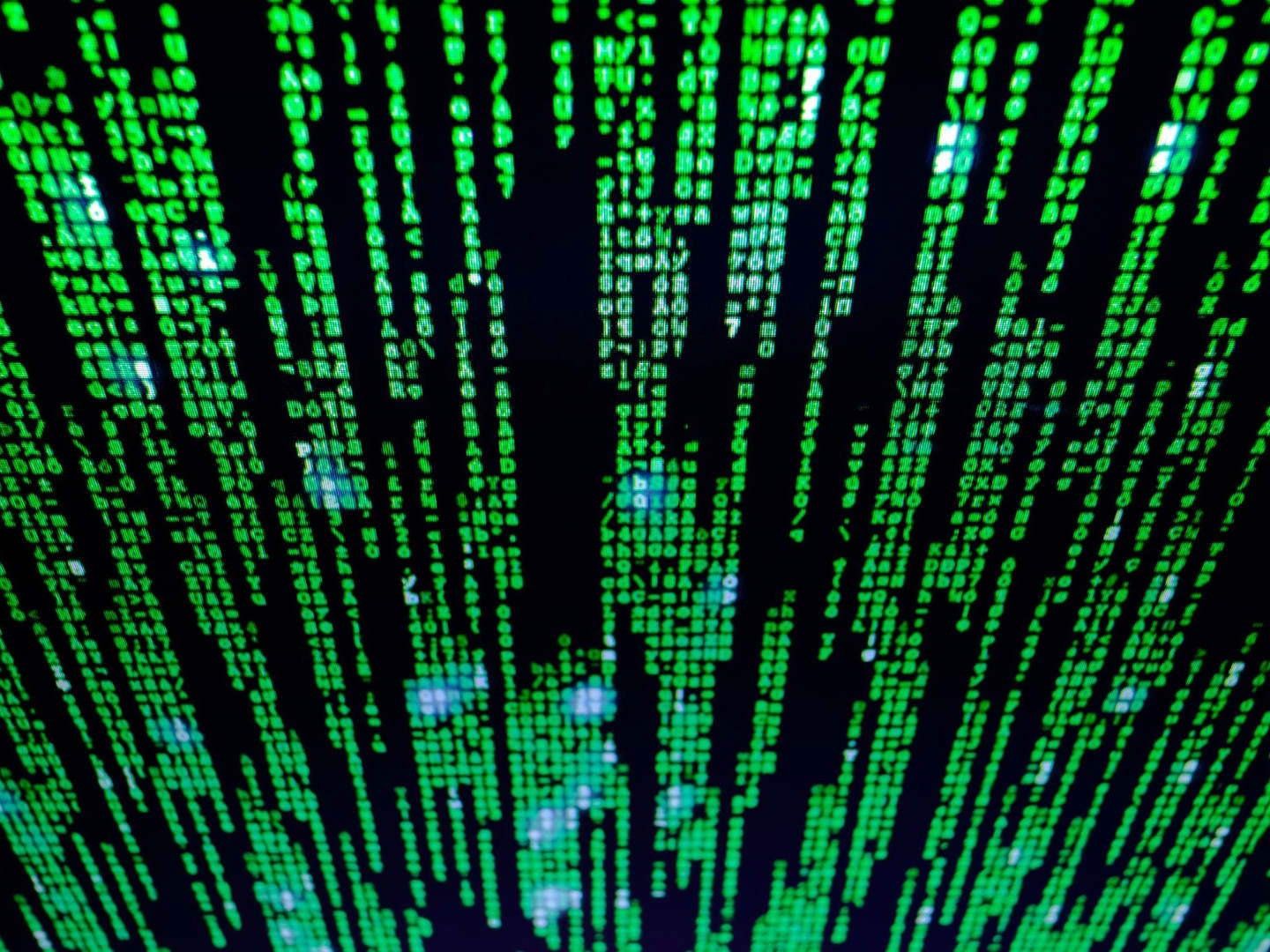
An Exposition of Ethical Concepts in the Movie “The Matrix”
The reason I think The Matrix is more reviewable than almost every other film is the plot and the philosophical and religious aspects of the story because with every viewing I catch something I didn't see before I saw it. Without spoiling the movie, I think I can mention a few more obvious elements. The film draws on the Messiah myth as Neo is a direct reference to Jesus in his name comparison (Neo = oNe, as in The One) but also concealed in his other name, Thomas A. Anderson. The first part of his last name, Anderson comes from the Greek Andros meaning "man" and combine this with the second part of his last name "son" and add a little imagination to the combination "son of man" that was a title that Jesus came up with for himself. Also, the first time we meet Neo, a man calls him (and I quote): "You're my Savior man. My own personal Jesus Christ." Besides the Christian elements, the film is also influenced by Buddhism, Gnosticism (Gnosis = knowledge) , but is also inspired by Plato and his comparison of the allegory of the Cave. Explaining these elements will make this review go on forever, so to all the people who doubt the profound nature of The Matrix, I can only give one piece of advice: Free your mind and watch the film again. I recommend it to all fans of sci-fi and people who like philosophy.
In this interpretation, Neo's path from The Matrix's green, illusory universe into the dystopian real world is a variation of Plato's cave allegory. To sum up: a person spends his whole life stuck in a cave where all they see are shadows on a wall before them, but because that's all they've ever seen, they take the shadows as the one true truth. One day that person, like Neo, is free to explore the truth beyond the shadows. That person was a philosopher for Plato and therefore will help others free themselves from the cave. For Neo, the cave's The Matrix. And Morpheus's led out. It's all more techno-dystopian than Plato ever thought, but the transition to the real world is not easy for both Plato's cave dweller and Neo. The sun-soaked planet blinds for a lifelong cave-dweller. For Neo, robots want to destroy him. Plato's Allegory of the Cave influenced countless philosophers even nowadays. Those who are "woke" and know the truth are oppressed, unwelcome, and live a dangerous life only to save the people who do not know the true purpose of Neo's existence in The Matrix. It is very symbolic of how Jesus Christ lived.
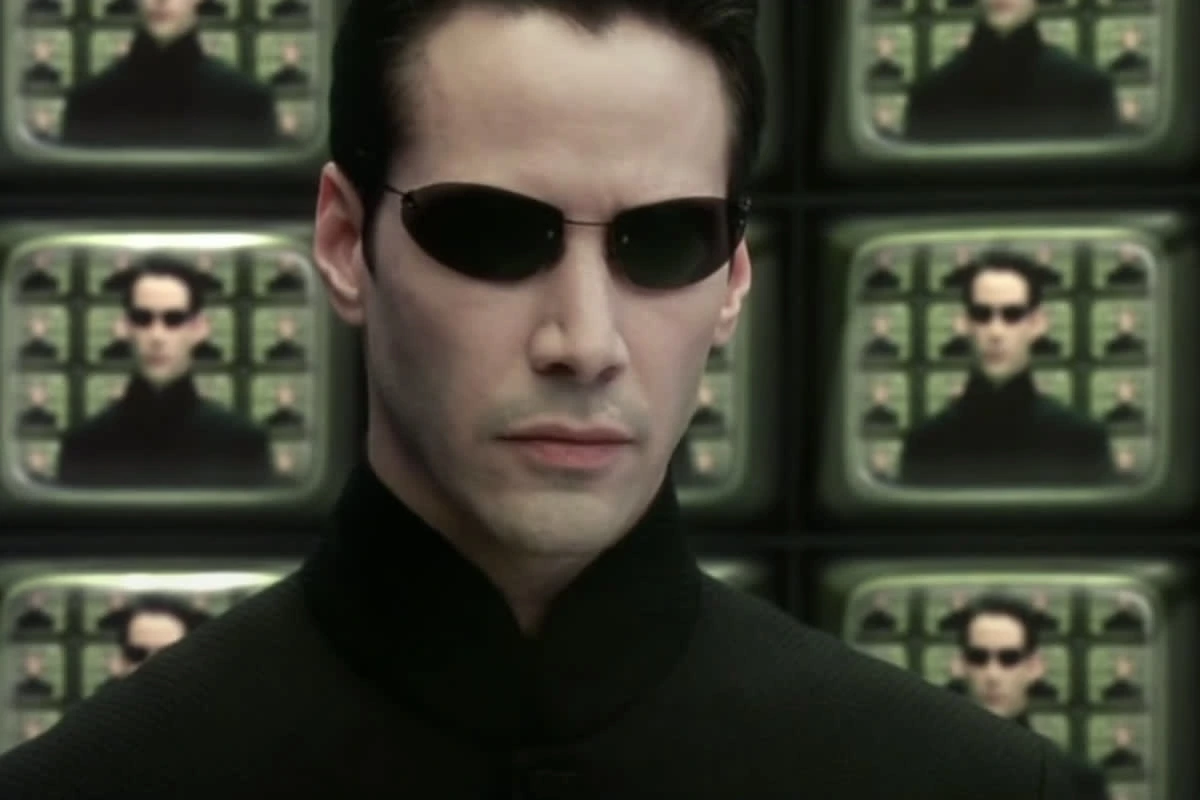
Neo
A man named Thomas Anderson (also known as Neo), lived an ordinary life during the year 1999. A software techie by day and a computer hacker by night, sitting by his monitor alone at home waiting for a sign, a signal - from what or whom he does not know - until one night, a mysterious woman called Trinity searches for him and introduces him to the faceless character he's been waiting for: Morpheus. Morpheus, a messiah of sorts, presents the truth about his life to Neo by throwing light on the dark mysteries that have plagued him for so long. The original Matrix tracks hacker Neo as he discovers that the world is a digital illusion and that to use mankind as a renewable energy source, robots have developed a massive simulation. In the "real world," Neo joins the human resistance and after some self-reflection, discovers his destiny as The One," a prophesied savior who will use his powers from The Matrix to liberate humanity. In other words, Neo’s exceptionalism is just part of the greater project to keep the human race enslaved. At the end of the film, Neo chooses to avoid perpetuating the vicious cycle of human oppression and risks the lives of all humans to save his love, Trinity. He also somehow has powers in the real world now.
“You take the blue pill - the story ends, you wake up in your bed and believe whatever you want to believe; You take the red pill - you stay in wonderland, and I show you how deep the rabbit hole goes.” The option of Neo caused The Matrix to deteriorate at the hands of Agent Smith, so a now-blinded Neo who can still see... Anything... something... Strikes equipment bargain. He would sacrifice himself to kill Agent Smith in return for freeing all people from The Matrix he wishes to be. Today, more than ever, cultural and political movements seem obsessed with escaping one's forced ignorance cave. Whether Matrix's own "red pill" is a symbol for awakening, or the “blue pill” is to live an everlasting dream. The Pills represent a false choice and there is no reason to assume that Neo would ever escape The Matrix (whether the Wachowskis meant this or not). Rather, it is more intelligible to think that the 'Neo Narrative' maybe The Matrix's basic program whereby each person is made the 'star of the show' so that their required egocentrism - the First-Person Viewpoint - fully assimilates them. Everyone in the First Person in The Matrix. The movie makes us participate in it by saying that we are ‘the one’ to choose our path. That's who it is The One. There are potentially millions of ways that their destiny is fulfilled by The One. All of it is just parallel processing. So, it doesn't matter which pill is selected - it just continues to another section of the same program. There does appear, however, to be a division there. The range seems binary. If I had to choose, I would do the sort of thing I do. I'd take all of them (pun intended.)
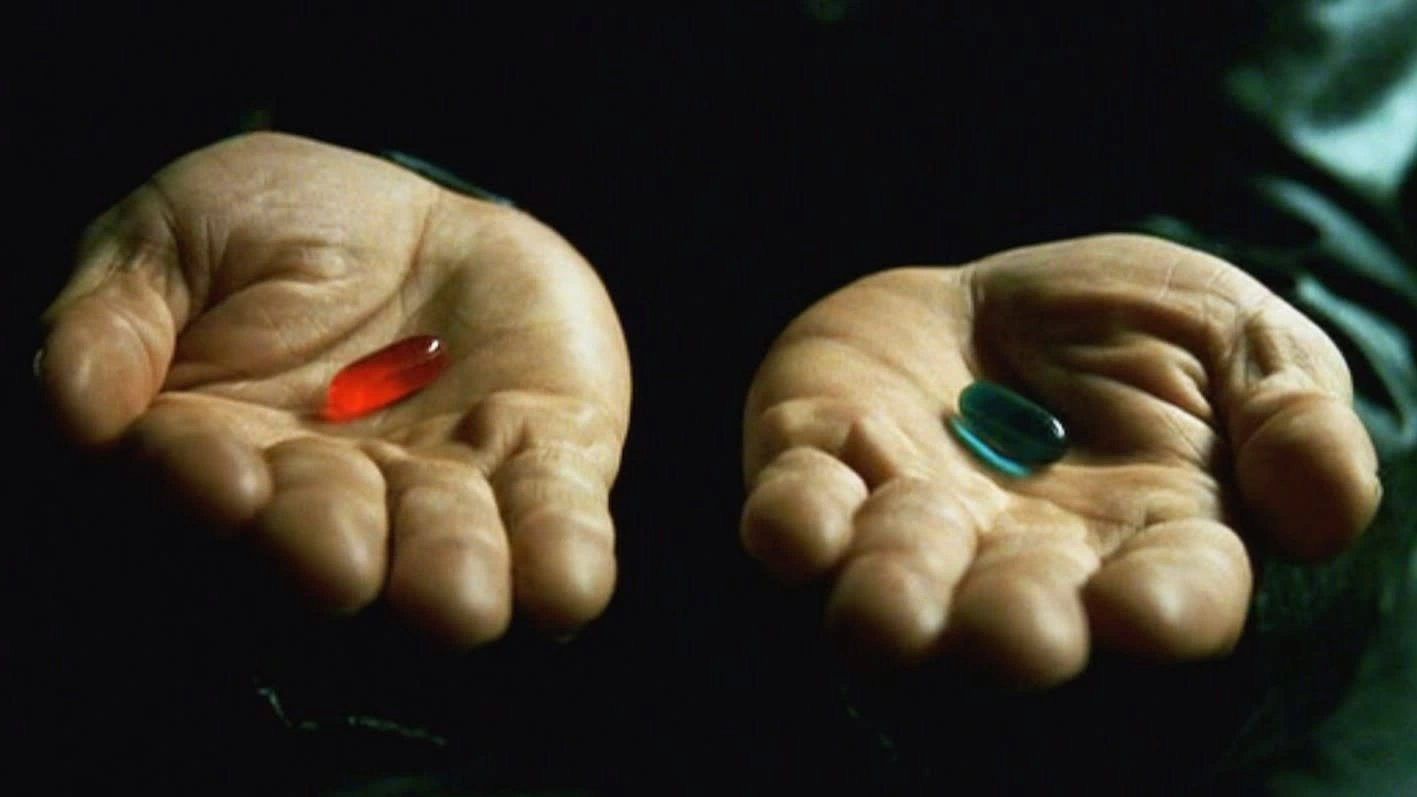
Red and Blue Pill
The value-neutrality and ladeness stand on the agent named Smith as cold and scheming. His etiquette, intonation, and behavior reflect that. He's almost indistinguishable from his pasty companions—until he encounters Morpheus. Smith loves meeting "the great" Morpheus. He condescends to present himself, flashes rage as he recuperates, and looks contemptuously as he prevails. Looking at Jones and Brown, Smith declares "the future is our world..." No doubt he takes more pride in his work than his peers. Here in this script Smith said there's a reality behind this that Neo failed to understand, bracketing my prejudices, I'd say what he's saying is true, but what's true isn't always right. He asks Morpheus to free him from The Matrix as a jail. He's desperate, lamenting humanity's repulsive. But he also says, "Once [it has been destroyed, there's no more reason for me to be here as such, this once-proud soldier, disgusted by his toils, sees liberation in death. As you can tell from these photographs, as the film continues, Smith grows “human-er” where Agent Smith gains some human traits like anger, sense of dread, hate, and eventually even a sly sense of humor. Based on the facts shown to us by the movie, even the machines realize that there is always freedom above the boundaries of machines. However, the truth is more horrifying, which is that algorithms have done such a good job of constructing data sets about each of us that they can accurately predict our desires. This brings us back to this tension between control and freedom: are we free when we exist in digital spaces?
In The Matrix, the technology design of machines and humans are the same, a single life, knowledge, and mechanism system. Without technology, 7 billion people cannot live on Earth—they created each other. Human beings act as "batteries" to the degree that their ignorance of reality enables the machine to drain or regulate their intrinsic life energies. The Matrix reveals secret layers of reality by breaking them out as observable objects, matrix simulation, agents, computers, etc. As colors are used in biology to illustrate the secret structure, The Matrix helps us to peek into our modern world's workings. This means that as systems become smarter and more educated by their knowledge and self-definition. Their unique character will emerge—a synthetic system that is conscious, self-defined, machined, learned, not programmer-designed, but developed from a system, and is indistinguishable from humans. As far as engineering is concerned, we can see that The Matrix could be consumerism (remember those talks about what chicken tastes like?) Bioelectricity representing money and consumption, and the network representing the media, the smoke blocking the sun will be the industrial revolution, and the fact that humans did not embrace a utopia could look at how we need our jobs to keep us happy. Maybe The Matrix is a sci-fi prophecy of things to come, even after the revolution, think of scenes looking at water refinery. We need them, they need us. In this reading, things are very literal, but the technical specifics are metaphorical. The network is our life with robots; if they don't reach our ambitions, they don't have much else to live for the computers are the senseless systems of development that drive us forward, forward, forward, tirelessly improving to do ever faster. In these structures, humans are held captive providing the energy to make them work. Without humans wired into the mindless progress machine matrix, it would starve to death, and everybody would eventually see what it's made of the planet. As it is, being tuned in absorbs so much time that it can be hard to remember what happens with mindless development.
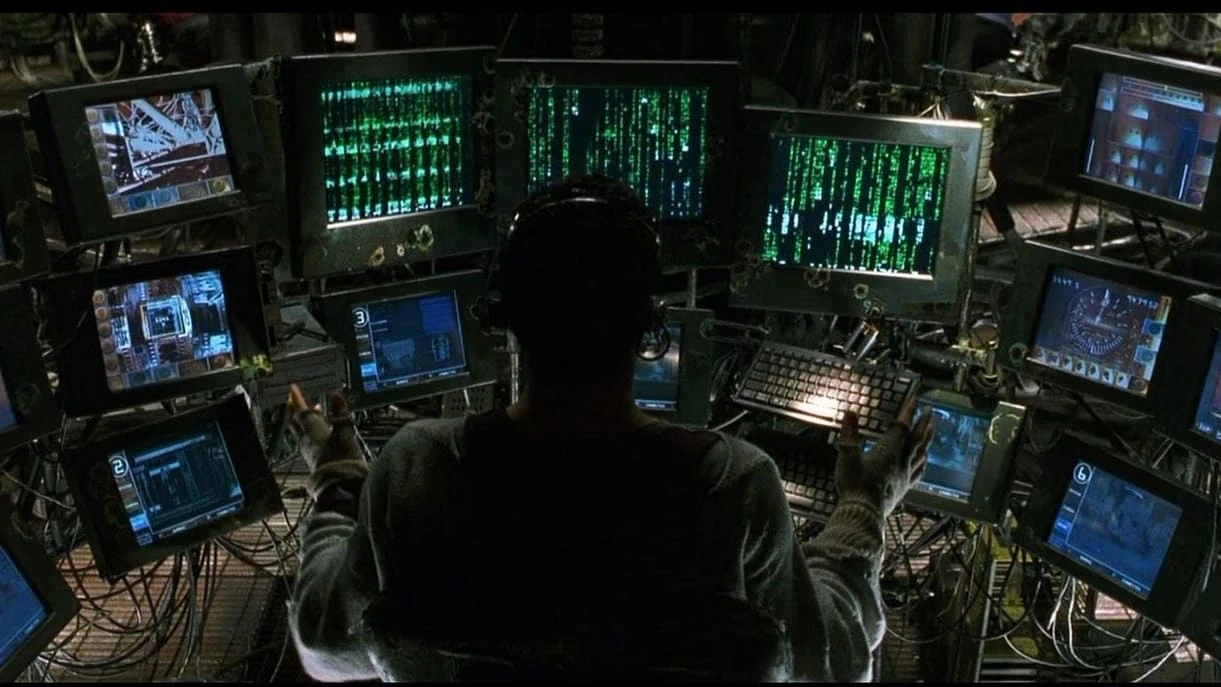
Ethical Theories
• During the confrontation in the courtyard where Neo faces the many agents of Smith for the first time, they're going about meanings. “Purpose it's that pulls us that guides us that drives us its purpose that defines, that binds us..." I can't help but think of Aristotle's teleology here the concept that everyone and all have a higher purpose that they're supposed to live up to and how we're supposed to live up to. The final cause of Aristotle is also emphasized by the Merovingian when he has his exposition in his restaurant about how it's not a motive, it's not a 'why.' The Key maker himself, his very existence, is a means, “it's not an end, and so, searching for him is looking for a means to do... what?”
• There is logical positivism itself. If our reality could be generated as an illusion that combined all of our semantics, we couldn't question it. The very problem of people including Morpheus, the Trinity, and the existence of the Oracle is waved away with certain mind tricks. If the simulation theory is possible, how is it called a 'simulation?' 'What's to suggest that Neo's 'escape' from Plato's cave is not just a move in the cave itself? Why do we believe Morpheus? The effort to link Neo's narrative to be an Arthurian Christ - merging humanity's hope with their cruel machine was the shallowest attempt I've ever seen at ecumenical epistemology. Why if people first built machines) would it make any difference? Neo's off. Mr. Smith won, adding. He had to look much more technologically. That's The Matrix dilemma - like the movie suggests, it's its undoing. Viewed through this prism, films are extremely cynical. Something is lacking about Believing Neo. His name is humorous, here's nothing 'new.' Logical positivism—ironically reality's a self-negative picture. Considering silence, we'd understand more about the Matrices that make up. They're made of rage and tone, doing nothing.
On Cypher and Ethical Theories
In the film Matrix, the intentions of the machines and the choices of Cypher are not just justifiable but can also be seen as something positive. Minus, the countless murders, and the wholesale betrayal of the human race, is Cypher doing anything wrong? How is the choice of Cypher morally justified? Initially, Cypher's alternative was to abandon the real world and return to The Matrix. In doing so, reveal Neo's whereabouts to the Agents and bring an end to the lives of many crewmates. In Nicomachean Ethics, happiness relies on living by the proper virtues, writes Aristotle. A virtuous person is inherently prepared to act in the right manner and for the right reasons. It seems that Cypher is behaving logically in the movie. Justice in a sense encompasses all the other virtues since just consists of exhibiting virtue. Cypher's Choice—Platonic Ethics notes that the good" is born of knowledge, and the evil" is born of lack of knowledge, Value Hedonism is Exposed where there are different causes of enjoyment, but pleasure is the same. In deciding to lead his life on his own for fun, he presupposes that pleasure is the only thing that could make his life worth living. The philosophy according to which happiness is the only thing of worth for its own sake. Without saying if his choice is 'right or wrong,' Cypher's choice can be justified by stating the following points: it was to achieve happiness; contentment is not happiness; Cypher finds ignorance to be bliss; there is no sense, no goal in life without happiness; an active state of well-being, well-being, and well-being; fulfillment of short-term physical and emotional needs.
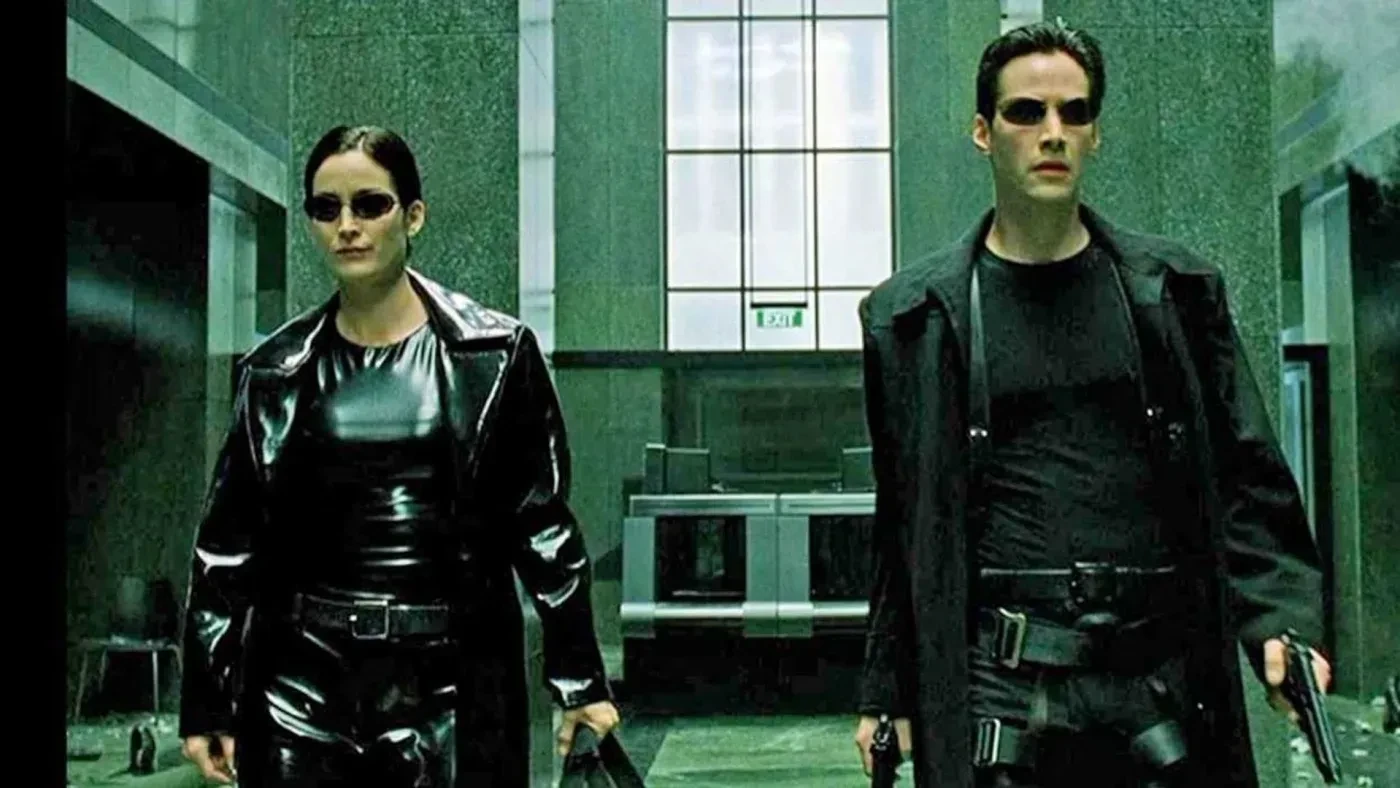
Conclusion
The film draws on the “Messiah” myth as Neo is a direct reference to Jesus in his name comparison. Besides the Christian elements, the film is also influenced by Gnosticism and Buddhism. The original Matrix tracks hacker Neo as he discovers that the world is a digital illusion. To use mankind as a renewable energy source, robots have developed a massive simulation. The film is recommended to all fans of sci-fi and people who like philosophy.
In the "real world," Neo joins the human resistance and discovers his destiny as "The One," a prophesied savior. In this interpretation, Neo's path from The Matrix's green, illusory universe into the dystopian real world is a variation of Plato's allegory. For Neo, the cave's The Matrix. And Morpheus's led out. The option of Neo caused The Matrix to deteriorate at the hands of Agent Smith, so a now-blinded Neo who can still see... Anything... something... Strikes an equipment bargain. He would sacrifice himself to kill Agent Smith in return for freeing all people from The Matrix he wishes to be.
Today, more than ever, cultural and political movements seem obsessed with escaping one's forced ignorance cave. "The Matrix" is about a man sent by The Matrix to free him from The Matrix as a jail. He's desperate, lamenting humanity's repulsive, but also sees liberation in death. As the film continues, Agent Smith gains some human traits like anger, a sense of dread, hate, and eventually even a sly sense of humor.
Even the machines realize that there is always freedom above the boundaries of machine. In The Matrix, the technology design of machines and humans are the same, a single life, knowledge, and mechanism system. Human beings act as "batteries" to the degree that their ignorance of reality enables the machine to drain or regulate their intrinsic life energies. The Matrix reveals secret layers of reality by breaking them out as observable objects, matrix simulation, agents, computers, etc. This means that as systems become smarter and more educated by their knowledge and self-definition, their unique character will emerge.
In the confrontation in the courtyard where Neo faces the many agents of Smith for the first time, they're going about meanings. I can't help but think of Aristotle's teleology here the concept that everyone and all have a higher purpose that they're supposed to live up to. Something is lacking about Believing Neo. His name is humorous, here's nothing 'new' Logical positivism—ironically reality's self-negative picture. Considering silence, we'd understand more about the Matrices that make up. The Matrixes. They're made of rage and tone, doing nothing. In the film Matrix, the choices of Cypher are not just justifiable but can also be seen as something positive. In Nicomachean Ethics, happiness relies on living by the proper virtues, writes Aristotle. A virtuous person is inherently prepared to act in the right manner and for the right reasons. Platonic Ethics notes that the good" is born of knowledge, and the evil" is born of a lack of knowledge. Value Hedonism is Exposed where there are different causes of enjoyment, but pleasure is the same.
The Physical Truth that we all perceive is an Illusion, and we as human beings, are generating this illusion through our thoughts. There's an "Elite" ruling society by mind control and brainwashing. Brainwashed human beings create the physical world that "Elite" wants to create. Humanity is in a deep state of Amnesia, and you don't know that the "Elite" rules them. Therefore, the problem root is invisible to those who are sleeping, and we have a status quo. The "Elite" would replace us with Artificial Intelligence and Robots. The so-called "Red Pill" reflects the awakening of human beings too who they are. We are all One Infinite Consciousness embodiments or Deity. At the beginning of Time, we all agreed to detach from One Eternal Consciousness to construct and experience the Physical World as Man. Part of the game was ignoring Who We Are for entertainment. Unfortunately, the game has become so devastating that civilization is about to vanish. We are just the Same Eternal Consciousness in Human Form, and there is no Savior. We are all intended to save one by one by Awakening. Metaphysics is Planet Earth's only science that helps humanity understand Who We Are, Our History, and Where We Go.
Books
McGrath, J. F. The Desert of the Real: Christianity, Buddhism & Baudrillard in The Matrix films and popular culture.
Aristotle, & Greenwood, L. H. G. (1973). Aristotle Nicomachean ethics (3rd ed., Vol. II ). Arno.
Irwin, W. (2016). The matrix and philosophy: welcome to the desert of the real. Open Court.
Journals
Bentham, An Introduction to the Principles of Morals and Legislation (New York: Hafner, 1948) and Mill, Utilitarianism (Indianapolis: Hackett, 1979).
Online Sources
Gill, N. S. Understanding Plato's Allegory of the Cave. ThoughtCo. https://www.thoughtco.com/the-allegory-of-the-cave-120330.
Johnson, M. R. Aristotle on Teleology. Oxford Scholarship Online.
Lam, T. Logical Positivism. Lumen. https://courses.lumenlearning.com/sanjacinto-philosophy/chapter/content-notes-4/.
Like this project
Posted Jan 14, 2023
The Matrix is a 1999 science fiction action film that explores the concept of reality and features mind-bending special effects and action sequences.
Likes
0
Views
23





